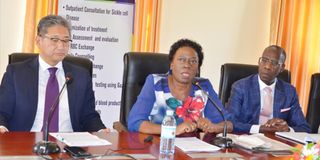Prime
JCRC, Canada varsity in student exchange

Left to Right. Prof John Yoo, dean Schulich School Medicine and Dentistry, Dr Cissy Kityo Mutuluuza, the Executive director of Joint Clinical Research Centre, and Dr Opiyo Oloya the associate vice president, Equity, Diversity and Inclusion at Western University address the media during the launch of the partnership on July 6, 2022 at JCRC headquarters in Lubowa. PHOTO | FILE
What you need to know:
- Athough Joint Clinical Research Centre (JCRC) has been working with Schulich, Canada for some time now, they made the collaboration between the two institutions known to the public earlier this month, so as to enhance training and research and education activities. This will allow the public to compete for the opportunity to take part in the exchange programme.
Exchange programmes have always been known to benefit the different institutions the participants are from. In Uganda, the recent emphasis on making the scientis.
Joint Clinical Research Centre (JCRC) launched a partnership with Schulich School of Medicine and Dentistry in Western University, Canada, with an aim to expand research, training and education reach impact in both countries.
The partnership that involves Makerere University College of Health Sciences and Mbarara University of Science and Technology targets science students from both countries and will see an exchange of these students from Canada to Uganda to study Medicine, carry out research in health, among other things and also students from Uganda moving to Schulich School of Medicine and Dentistry for studies and research.
Addressing media recently, Dr Cissy Kityo Mutuluuza, the executive director of JCRC, said they have been working with Schulich for some time now, and they just wanted to make the collaboration between the two institutions known to the public so as to enhance training and research and education activities.
“We have decided to work with this institution because they are among the best in the world that is why we are very excited about the future prospects of this collaboration,” Mutuluuza said.
“Prof Eric Arts, one of the Schulich delegation in 1999 supported us to establish a molecular laboratory running at the JCRC, and was the director up to 2014. This laboratory, performs HIV drug resistance and is supporting the government to monitor the national HIV treatment programme to ensure that the HIV is still responding to available antiretrovial drugs,” she added.
She explains that Prof Arts trained personnel that are running this laboratory and has continued to collaborate with JCRC by conducting research through his initiatives that he has brought them. Also, through his effort JCRC has got a memorandum of understanding.
“Today, the laboratory has grown and is accredited by World Health Organisation (WHO),College of American Pathologists, and this is the highest level of accreditation you can get anywhere in the world,” Dr Mutuluuza emphasised.
What is in it?
JCRC says they are looking at scientific advances, technology transfer, and exchange of students between the two institutions.
“We have had students from Schulich that have been here for two months, but we are also looking at how Ugandans can benefit from this collaboration, considering training that is not available in our country that our students can benefit from Canada,” Dr Mutuluuza said. She added that the collaboration will strengthen efficiency of JCRC’s research since the partnership will go on for 100 years or more.
“I am so grateful for this opportunity that will see Ugandan students enrich their knowledge in research on health issues which will eventually contribute to the boost the health system of our country,” Dr Mutuluuza said.
How these students will be chosen from Uganda will depend on their capabilities. Those that can do medicine or dentistry will also go for that, and students will choose their areas of interest. It will be competitive so that the best are chosen to represent Uganda abroad.
Prof Arts, expressed gratitude for the partnership saying it would allow for innovation of new ideas through research.
“Our students that have been here for two months have learnt a lot in Uganda. I heard that during their presentation, Uganda is a country rich in knowledge and that is why this partnership will be of great essence to everyone,” Prof Arts noted.
The benefits to students
Prof John Yoo, the dean of Schulich School of Medicine and Dentistry, said they have had a formal relationship with JCRC for a long time.
“We have realised the benefits and transformation of the education that our students received in the programmes that were running between Schulich that JCRC, and over time, we have learnt that education is important, and we want to broaden and expand that opportunity for all of us to benefit because it is a high priority for our university,” Prof Yoo said.
“Through that relationship, we educated 100 of our students at JCRC that is why we are formalising this relationship so as to develop a stronger bond.”
Dr Opiyo Oloya, the vice president for equity, diversity and inclusion at Western University , said going into another country enables one to learn so many things. For example, young Canadian students coming to learn medicine in Uganda is unique and, they are learning to become global health care providers, and this also applies to Ugandans that will go to Canada to learn medicine.
“Canada is being filled by immigrants, so if you are a medical practitioner and a health provider, you, must have an understanding of how to provide healthcare to all these people coming in the country, and I think this collaboration prepares these young Canadians and gives them the opportunity to learn,” Dr Oloya said.
“I heard our students make presentations and, they are not the same as they came. They have learnt so much and as a Ugandan, this makes me proud to see Canadians come here to learn. Let us work hard so that we see this collaboration make Ugandan students also move to Canada to learn with their counterparts,” he added.
Dr Oloya said Western University has been working towards being a university that is diverse, welcoming people from different parts of the world.
“Diversity, inclusiveness is what I do in this university, we have made progress in about nine months. When I had just joined, the university only had three scholarships for black students but we now have 45. We are also looking at other opportunities for international students not only from other parts of the world but also from Africa,” Dr Oloya explained
“We have a world class facility in Uganda, so this relationship will deliver, so that we have traffic both ways. We need to extend it to not only Schulich but the whole university,” he added.
About JCRC
The Joint Clinical Research Centre (JCRC) was established in 1991 as a limited liability not-for-profit joint venture between the Uganda Ministry of Health, Ministry of Defence and Makerere University Medical School (now Makerere College of Health Sciences). The Centre was established to respond to the HIV/Aids challenge which was at the peak by that time.JCRC pioneered the use of Anti-Retroviral Therapy (ART) in sub-Saharan Africa in 1992 through a research project to determine the lowest effective dose of Zidovudine.





